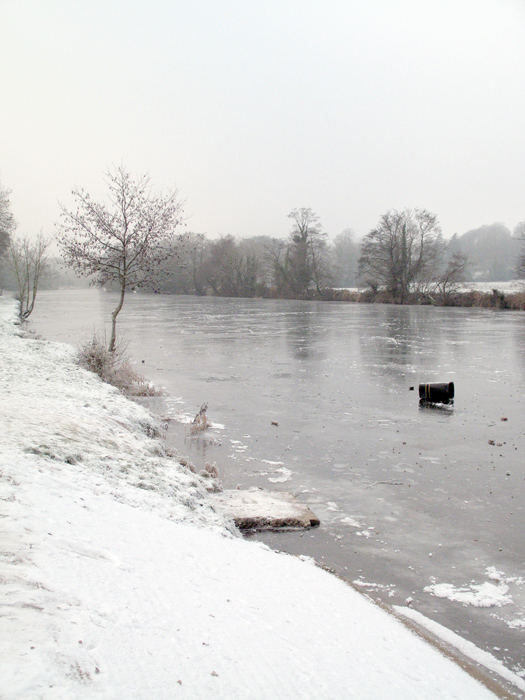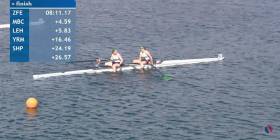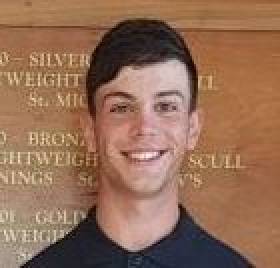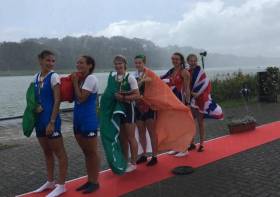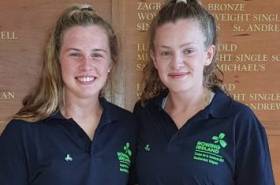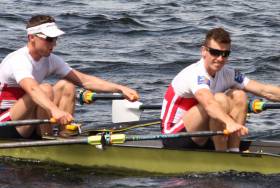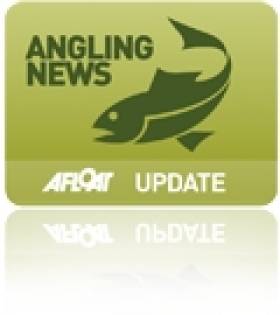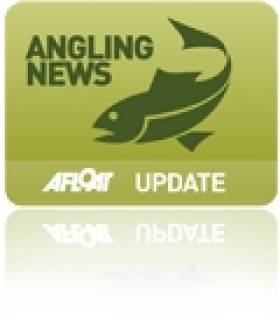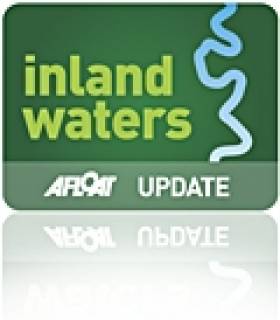Displaying items by tag: Fermoy
Fears That Pandemic Has Dealt Fatal Blow to Fermoy Angling Festival
Fears are growing that Fermoy’s celebrated coarse angling festival may not take place again as the pandemic has hit key businesses in the East Cork town.
As the Irish Examiner reports, the Fermoy Coarse Angling Association called off two events on the River Blackwater last year due to COVID-related restrictions, as well as a third event this past May.
It’s now cancelled what would have been its calendar highlight next month, owing to a lack of tackle shops and suitable accommodation in the area, according to the club chairman.
Fermoy’s last remaining hotel closed recently, and there has been a reduction in the number of B&Bs to accommodate anglers from all over Ireland and the UK.
The growth of online shopping has also been blamed for the closure of the town’s tackle shops — with the nearest in Coachford more than 60km away.
The Irish Examiner has more on the story HERE.
#Rowing: Commercial won a stunningly-close race to take the men’s senior eights title at the Irish Rowing Championships today. NUIG/Queen’s had a slight lead ahead of a tightly-packed field early on, but Commercial moved at the 1,000 metres. They could not shake off UCD and the NUIG/Queen’s composite. UCD
finished really fast and almost – but not quite – caught Commercial, who were taking their third consecutive title.
The women’s senior eight went to Skibbereen. Their talented crew, stroked by Denise Walsh, had a clearwater lead over NUIG, who did not give up the fight but finished second. Skibbereen lifted their title haul to eight with the win.
Enniskillen started the evening session with two wins, in the women’s club eight, where Shandon pushed them, and the men’s junior pair, who were imperious in their victory.
The women’s junior coxed quadruple from Workmen’s was similarly impressive – the quality of junior rowing was a remarkable aspect of this regatta.
Another notable aspect was the proportion of wins which went to Cork clubs. Two of the last three titles did not leave the rebel county: UCC finished out their successful programme with a win in the men’s intermediate double through Ronan Byrne and Hugh Sutton, while Selma Bouanane took the last race of the event, the women’s intermediate single, for Fermoy.
Irish Rowing Championships, Day Three (Selected Results)
Men
Eight – Senior: 1 Commercial (S Mac Eoin, C Cunningham, L Cameron, N Beggan, P Moreau, F Groome, M Corcoran, C Dowling; cox: M Crockett) 5:43.18, 2 UCD 5:43.76, 3 NUIG/Queen’s 5:46.82.
Four – Club, coxed: UCC A 6:38.03.
Pair – Inter: Shandon A 6:56.07. Junior: Enniskillen 6:56.199.
Sculling, Double – Inter: UCC 6:32.59. Junior: Castleconnell (R O’Neill, J Desmond) 6:49.97.
Lightweight Single: Skibbereen (A Burns) 7:20.56.
Women
Eight – Senior: 1 Skibbereen (L Heaphy, O Hayes, M Piggott, A McCarthy, N Long, N Casey, A Casey, D Walsh; cox: A O’Neill) 6:28.42, 2 NUIG A 6:33.32, 3 Trinity 6:48.35. Club: Enniskillen 6:48.33.
Four – Inter, coxed: Cork 7:22.36.
Pair – Junior: Fermoy (E O’Reilly, G McGirr) 7:48.69.
Sculling, Quadruple – Junior: Workmen’s 7:01.06.
Single – Inter: Fermoy (S Bouanane) 8:03.25.
Lightweight Single: 1 Lee (M Cremen) 8:06.97
Fermoy, Enniskillen and Bann Take Golds, Silver and Bronze at National Schools' Regatta
#Rowing: Irish crews took a full set of medals – gold, silver and bronze – in Championship finals on another excellent day at the British National Schools’ Regatta on Dorney Lake on Sunday. The Fermoy pair of Ellie O’Reilly and Gill McGirr powered away from their opponents in the second half of the Championship Pair A Final, while Enniskillen’s Nathan Timoney and Odhran Donaghy took a comfortable second in the men’s race. Aaron Christie of Bann held out well to hold on to third in the Championship Singles. Enniskillen also took a gold medal in the junior 16 girls’ pair, through Zoe McCutcheon and Maeve Donnelly.
British National Schools’ Regatta, Dorney Lake (Selected Results; Irish interest)
Saturday
Boys
Championship/Non-Championship Eight – B Final: 3 Enniskillen RBC.
Girls
Championship/Non-Championship Eight – B Final: 2 Galway 7:35.72; 3 St Michael’s 7:45.46.
Junior 16 Four, coxed – A Final: 2 Enniskillen RBC 8:22.68.
Sculling, Double – Championship A Final: 2 Workmen’s (A O’Donoghue, C Browne) 8:06.37.
Single – Championship A Final: 7 Workmen’s (C Moynihan) 9:10.40. B Final: 1 Coleraine Grammar School (M Curry) 8:43.03.
Sunday
Boys
Championship Pair: 2 Enniskillen (O Donaghy, N Timoney) 7:19.06.
Sculling, Championship Singles: 3 Bann (A Christie) 7:39.46.
Girls
Championship Pair: 1 Fermoy (E O’Reilly, G McGirr) 8:11.17.
Junior 16 Pair: 1 Enniskillen (M Donnelly, Z McCutcheon) 8:08.80
Curry and Keating Top Double at Trial [UPDATE]
#Rowing: Molly Curry and Aobhinn Keating had the fastest time in a women’s double at the Ireland junior trial at the National Rowing Centre in Cork. The Coleraine Grammar School and Skibbereen combination covered the 2,000 metres in seven minutes and 45.13 seconds. We apologise for having got this wrong in the original report.
Five Gold Medals for Ireland Rowers as Fermoy Pair Win Again
#Rowing: Ireland took its fifth gold medal of the Coupe de la Jeunesse in Hazewinkel in Belgium today. Gill McGirr and Eliza O’Reilly were emphatic winners of the junior women’s pair. They led in silver-medal winners Italy by over six seconds. Britain took the bronze.
The two Fermoy women had also won gold on Saturday.
Earlier, the junior men’s quadruple had taken their second gold. Georgia O’Brien and the men’s four finished fourth and fifth respectively in their A Finals.
Coupe de la Jeunesse, Hazewinkel, Belgium – Day Two (Irish interest)
Junior Men
Four – Heat One: 2 Ireland (A Johnston, R Corrigan, B Connolly, N Timoney) 6:29.73. A Final: 5 Ireland 6:22.36.
Quadruple – Heat One: 1 Ireland (B O’Flynn, M Dundon, J Keating, J Quinlan) 6:20.92. A Final: 1 Ireland 6:10.07.
Junior Women
Pair – A Final: 1 Ireland (G McGirr, E O’Reilly) 7:37.86
Single – Heat: 1 Ireland (G O’Brien) 6:21.42. A Final: 4 Ireland 8:16.84
#Rowing: Gill McGirr and Eliza O’Reilly won gold at the Coupe de la Jeunesse in Hazewinkel in Belgium today. The Fermoy girls brought Ireland’s gold medal tally to a remarkable three. They were big winners, beating Britain’s Lucy Pullinger and Frances Curtis by eight and a half seconds. Italy took the bronze.
Earlier single sculler Georgia O’Brien and the men’s quadruple had taken gold.
Coupe de la Jeunesse, Hazewinkel, Day One (Irish interest)
Junior Men
Four – Heat One (First Three to A Final): 3 Ireland (A Johnston, R Corrigan, B Connolly, N Timoney) 6:23.78. A Final: 5 Ireland 6:27.89.
Quadruple – Heat One: 1 Ireland (B O’Flynn, M Dundon, J Keating, J Quinlan) 6:12.81. A Final: 1 Ireland 6:12.16, 2 Italy 6:14.58, 3 Britain 6:15.07.
Junior Women
Pair: Final: 1 Ireland (G McGirr, E O’Reilly) 7:48.50, 2 Britain 7:57.02, 3 Italy 8:00.26.
Single Sculls – Heat Two (First Three to A Final): 1 Ireland (G O’Brien) 8:10.17. A Final: 1 Ireland 8:09.83, 2 France 8:10.16, 3 Britain 8:14.57.
Lynch Has Terrific Win at Irish Rowing Championships
#Rowing: Two outstanding races brought the first session of the Irish Rowing Championships at the National Rowing Centre to a close today. Daire Lynch of Clonmel won the junior single sculls. He caught and passed Shandon's Ronan Byrne in the final quarter, but Byrne refused to give in easily and the two swept towards the finish line with a small margin separating them - Lynch won by just over four tenths of a second.
The junior women's double had a similar profile: Skibbereen hunted down and caught leaders Bann and held off their late charge to win by just over three tenths of a second.
UCD had a surprisingly emphatic win over a Skibbereen/UCC composite in the women's senior four - a first senior win for bow woman Eimear Lambe. In the men's double, Shane O'Driscoll and Mark O'Donovan were similarly impressive in their win over Old Collegians.
Neptune had started the session with their first Championships win in years, in the novice coxed quadruple. Fermoy won the women's Club coxed four, while Cork and NUIG won hte women's intermediate pair and men's intermediate coxed four respectively.
Irish Rowing Championships, National Rowing Centre, Cork, Day One (Selected Results)
Men
Four - Inter, coxed: 1 NUIG 6:26.811.
Sculling, Quadruple - Novice, coxed: Neptune 6:44.559.
Double - Senior: 1 Skibbereen 6:32.773, 2 UCD 6:34.914, 3 Castleconnell 6:39.727.
Single - Junior: 1 Clonmel (D Lynch) 7:04.040, 2 Shandon (R Byrne) 7:04.462, 3 Shandon (S O'Sullivan) 7:23.197.
Women
Four - Senior: 1 UCD 6:54.652, 2 Skibbereen/UCC 6:58.902, 3 Trinity 7:04.715. Club, coxed: Fermoy 7:16.116.
Pair - Intermediate: Cork 7:36.488
Sculling
Double - Junior: 1 Skibbereen B 7:19.682, 2 Bann 7:91.995, 3 Neptune 7:33.305.
Two Prosecuted For Illegal Fishing of Spawning Salmon
#Angling - Two men have been prosecuted in Co Tipperary for illegal fishing of spawning salmon.
Michael Harding of Bansha and Neill Collins of Cullen were prosecuted by Inland Fisheries Ireland (IFI) following investigations on the River Aherlow at Angelsboro, Co Limerick on 2 January this year.
IFI fishery officer Noel Power told Judge William Early at a sitting of Fermoy District Court on 3 May that both men has been observed fishing by night with a lamp and a spear.
Having heard the evidence, Judge Early convicted both men and levied fines on each: €350 for Collins and €300 for Harding, who informed the court he was unemployed. Both men were also ordered to pay costs amounting to €418.90.
"Wild Atlantic Salmon are part of our heritage," said Minister Fergus O’Dowd following the prosecution, "and the killing of spawning fish is an environmental outrage.
"I once again commend the work of IFI staff, working in remote areas, in the worst of weather, late at night protecting our wild salmon."
IFI reminds all anglers that interference with fish over their spawning beds is a serious offence, and that its staff are involved trying to stamp out this activity.
Much illegal fishing takes place at night, and IFI staff patrol the rivers during winter nights to ensure the protection of fish stocks.
"This illegal fishing is both barbaric and a threat to spawning salmon," says the fisheries agency. "Spears and modified forks are sometimes used in tandem with lights in the illegal killing of spawning salmon."
Tributes Paid in Fermoy to Champion of Angling Jack O'Sullivan
#ANGLING - The Corkman has paid tribute to the late Jack O'Sullivan, one of the best known Irishmen in the coarse angling fraternity.
"He is a man who worked hard to put the town of Fermoy, and the stretches of the River Blackwater that enhance it, to the forefront of tourism," the paper writes.
"For 25 years he led from the front, not just by putting Fermoy on the map as a coarse angling destination but also his country, when he brought the likes of the World Coarse Angling Championships to Fermoy in 1968, and many other prestigious events down through the years."
A founder member of the National Coarse Fishing Federation of Ireland (NCFFI), in 2007 O'Sullivan received a gold medal from the organisation for his services to the Fermoy Coarse Angling Association, and angling tourism both local and national.
The Corkman has more on the story HERE.
River Blackwater Freezes Over
The Munster Blackwater froze over in the middle of Fermoy town preventing anyone from launching boats. Never in living memory on this inland waterway has this occured before writes Timmy Carey.
In 1963 there was some ice on the river during heavy snowfall, but on that occassion the river froze only half way across. A local Fermoy historian Christy Roche thinks that this is the first time that the Blackwater froze right across since 1601, on that occassion it was recorded that Red Hugh O Donnell and Hugh O Neill crossed a frozen river Blackwater on their way to the Battle of Kinsale.
The photo below shows a frozen river Blackwater at Barnane walk in Fermoy, Co. Cork.
